Eat Well, Spend Less: Simple Bites Goes Shopping
Marché is French for ‘market’, and one of the early words my three-year-old picked up, even though we’re an English speaking household. The open markets in and around Montreal are a pretty big part of our food shopping routine, hence Mateo’s early handle of the French word.
Shopping – conscientious, intentional shopping – is an integral part of eating well while managing to spend less.
Today, in our final post of the Eat Well, Spend Less series, I want to talk about how I stock my kitchen from bottom to top. I’ve already covered homemade pantry staples and frugal dinners in this series, but the ingredients for all that cooking and baking don’t just materialize on their own.
Food shopping is as particular and unique to each home as is their cooking style, taste preferences and health goals. My particular approach may not work for you, but I am confident I can offer a few nuggets of wisdom to help you get the most bang for your buck.
Now, what I am about to divulge might shake things up a little: I don’t use coupons. Go ahead, wag your finger, but just don’t stop reading!
Yes, coupons might be the first trick that comes to mind when contemplating ways to save money while stocking the fridge, but then one would have to shop at the supermarket to use those coupons. On a usual shopping outing, the supermarket is the last stop of the day – and I often don’t even need to stop.
So where do I buy our groceries? Let’s take a little city tour, shall we?
Diver-‘City’: My Selective Shopping Solution
As a resident of one of the top cities in the North American food scene, I am fortunate to have a wealth of ingredients at my fingertips. Spices from a top quality spice merchant, local cheeses, apples by the bushel, and, of course, pure maple syrup are just a few of the choice local ingredients that reside in my pantry.
Because I have options for shopping, I don’t have to stick to the supermarket. Quite the contrary, in fact. Sitting down to write this post really made me realize how much I jet all over town (and country) to get what I need.
I am convinced, however, that the savings I make when purchasing from the source, far outweigh the time (and gas) spent in seeking the items out. Not to mention the selection offered is wider and the quality of the ingredient are generally much better.
Here is a breakdown of eight places we go to get our food in a typical month.
1. City markets
Montreal is fortunate to boast several year-round public markets which showcase the best products our province has to offer. I live just outside of the city, so in the summer months I also shop at roadside stands and farmers’ markets.
Grocery List Items: Local fruit and vegetables, honey, cheese, organic meat, bread, cured meats, and much more.
2. Costco
My husband ‘converted’ me to Costco. And it wasn’t an easy reform. I loathed the cold approach to shopping the warehouse offered, but Danny, ever the numbers guy, proved to me just how much we could save by buying certain items in bulk. We frequent Costco probably twice a month.
Grocery List Items: organic milk, coffee beans, olive oil, butter, eggs (for now), organic dried fruit, chocolate chips, some organic grains and more.
3. Local Farms
I’ll admit we’ve been lax in discovering local farms that sell directly to the customer, but with a wide variety of farmers represented at the city markets, we are still tapping the local .
It’s not summer without berry picking and an autumn doesn’t pass without several trips to the apple orchards – those farms, at least, are taken advantage of. We also buy half a cow every fall from a small producer we know. We actually visit the farm and pick out the cow; that young Angus on the right? Yep, he inspired an entire series once.
Grocery Items Sourced: Organic beef, cheese, lamb, berries, apples, squash, and more.
4. International Markets
Again, Montreal is a diverse city and we have the shops to prove it. From the smallest Chinatown corner store to the near-Costco sized Kim Phat – these are the places to get basement prices on international ingredients.
Grocery List Items: rice, soy sauce, fish sauce, hoisin, rice paper, noodles of all kinds, tofu, bones for stock, coconut milk, and much more.
5. Health food store
Tau is our chain of health food stores, like a small version of Whole Foods. As it is one of the only “all organic” stores around town, prices are a bit steep, so we shop conscientiously for those critical items we can’t get elsewhere.
Grocery List Items: baking staples, grains, organic ‘dirty dozen‘ produce, natural sweeteners, and more.
6. Supermarket
While I’ll admit to an occasional Sunday night “blitz” for the upcoming week’s menu (due to lack of planning – yep, it happens!), I try to avoid the supermarket as much as possible. Why? It won’t offer the best produce, ethnic ingredients will have sky-high prices, and processed food is rampant. Reasons to avoid supermarkets are a post in themselves (or, if you’re Michael Pollan, a book).
Grocery List Items: sour cream, yeast, some baking ingredients, fresh baguettes.
7. Specialty Shops
Montreal is known for its bagels, so why bother buying the sugary, doughy supermarket versions when I can stop off at St-Viateur and get a couple dozen straight out of the wood burning oven? Bagels are just one specialty item that I am willing to drive out of my way for.
Grocery List Items: bagels, spices, tortillas, coffee beans, SAQ (our local liquor monopoly)
8. Homegrown
We are working towards having our own garden produce and fresh eggs. Hopefully in a matter of weeks it will be a reality! Since we recently moved to the third acre we now call home, we are starting from scratch, and as anyone with a garden will concur, these things don’t happen overnight.
Everything in good season.
The Equation
If there was an equation that could quantify how to best do your shopping, while factoring in the extra time to shop at multiple places (time is money), the extra gas dollars spent getting there, but also the increased quality of food as well as the savings – then I’m sure it would rank right below Angry Birds on the App Store.
Although not for everyone, there are ways to make selective shopping work for you. Do you have the time it takes to visit a butcher, bakery, ethnic corner store and the farmers market each week? If you (or hubby) can incorporate it into your day, or make it a weekend outing, then this could be possible for a family with two working parents.
Do you have the means of transportation to get around? Groceries get heavy fast, which can limit foot travel. Is it realistic to cross town to get condiments from Chinatown?
If you can
- a) source the cheapest versions of your grocery staples
- b) take the time to gather them from their various locations and
- c) easily transport them back to your kitchen
then you are going to be eating well and spending less.
Dollars and Cents
We spend about $150 per week on groceries. I’ll be the first to say that, yes, it is somewhat high for a modest family of four, but here are a few reasons why we are willing to spend that much.
I entertain frequently, everything from casual lunch play dates to parties of up to 50 people. I also cook for others often, participate in bake sales and church social events, and edit two food blogs. It all adds up!
In fact, considering the amount of food that passes though my kitchen, $150/week is actually a fairly low number. Certainly, selective shopping helps keep it as low as it is, as well as these ten ways to conserve grocery coin.
We eat out perhaps twice a month, never order take-out, and watch our ‘impulse buys’. If we didn’t take care, those three actions could quickly gouge the budget.
Shopping Tips for Saving Money and Sanity
- Make a List. And don’t leave home without it! I keep a running list in plain view and add items as they are close to being depleted. Sticking to a list helps avoid impulse buys as well as ensures you only purchase what you need for the week and no more. Less waste means more money in your pocket.
- Stock Up. A well-stocked pantry means less shopping trips, inspiration for last-minute meals and helps maintain a diet of healthy, natural food. You wont go ordering take-out if you have the fixings for a great meal in your pantry.
- Don’t Rush. Admittedly a hard rule to follow when were all so busy, but when I slow down during a shopping trip, I am able to correctly cross-check prices, read and understand labels, select properly ripened produce, and spot the shrinking packaging scams.
- Bring those Reusable Bags. Its embarrassing to admit, but upon a recent tally, I discovered I owned twenty-one reusable bags – and I still occasionally forget to bring them with me on shopping trips. Doh!
Final Tip: Read flyers online
Just because I don’t use coupons and check grocery store flyers, doesn’t mean they aren’t helpful to many, many people. But here’s my tip: read flyers online!
Have a question about my grocery shopping strategy? Ask away! Feel free to offer your own tips as well.

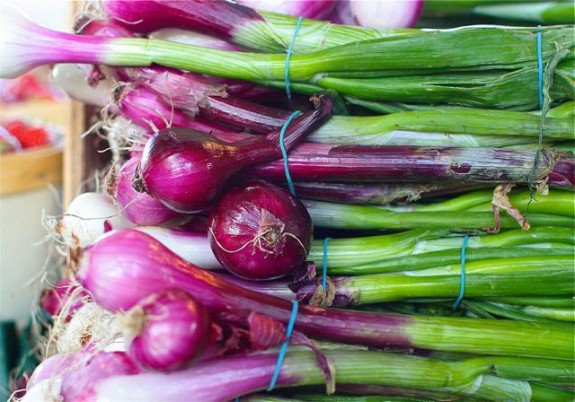

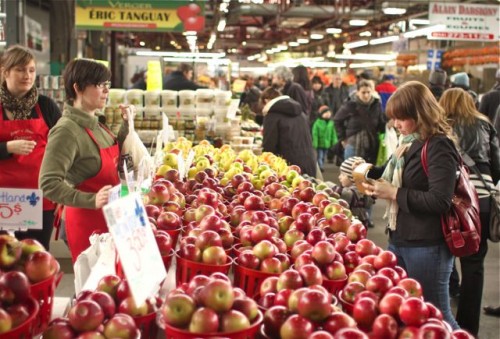

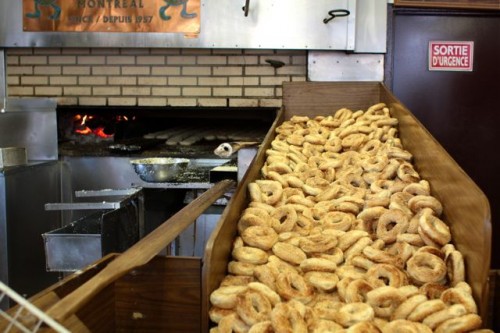

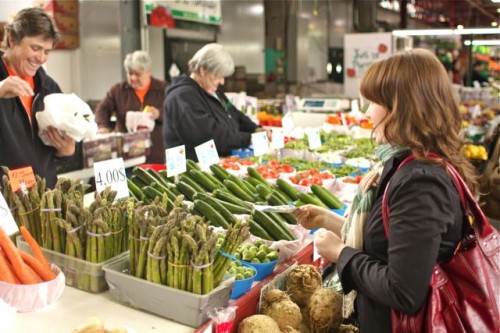

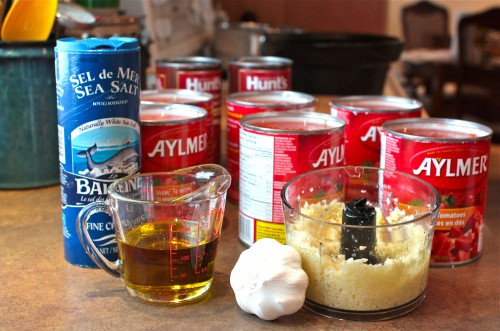
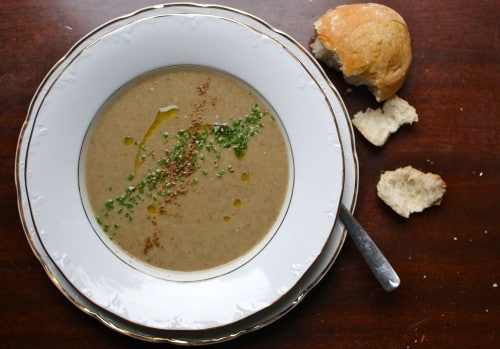



I loved this tour and all the lovely pictures. You are so fortunate to have such fabulous resources.
Hi Maris, I know I am blessed and do not take these local resources lightly.
Wow – what a resource you provided here, Aimee! These tips helped me to re-organize my shopping trips and gave me the courage to shop at some ethnic markets around town. I DO live in Chicago, so I have many choices. I’m going to bookmark and share this post with my local Weston A. Price Chapter. Cheers!
I’ve heard great things about Chicago’s markets. Don’t you have the famous Green City Market?
Thanks for sharing the post!
Great post Aimee. I’m looking forward to reading all about your chickens arriving and the fresh bounty that they (hopefully) produce for you. Noah and Mateo are going to be so excited!
They ARE excited! I’ve told them they could each name one, so you can imagine some of the suggestions flying around. 🙂
These posts are so insightful – I am horrible about planning ahead for the best prices at the market.
Fabulous tips Aimee! Love that berry photo! *swoon*
Thank you for sharing these tips. We have a lot of local farmers markets in the area and ethnic shops. I’m slowly making my way to them to compare prices with the super market. I really do want to get away from super market shopping if I can manage it. This has been very helpful.
Hi Rana, definitely start with the ethnic markets. I’ve found $2/bottle mark-ups in the grocery store on common items such as soy sauce and fish sauce. Sourcing them at the ethnic shops has definitely made a difference.
Good luck with your journey!
My biggest time and money saver:
http://www.soscuisine.com , a Montreal-based weekly menu planning email service, compiles all the flyer specials for your postal code! You can un-check the stores you don’t go to which even further simplifies the cross-checking of prices. I love it. I’ve never used their menu ideas, but I always look at the flyer compilation on Friday when it comes out. That way I have a week to plan trips to the store(s) that I want to go to and plan my shopping list.
Thanks for sharing, Faustina, I’ve heard good things about ‘SOS Cuisine’.
Sounds like you have a great system!
I love this! LOVE it! Quite honestly, I had no idea that a “European” shopping experience was so close to home. It sounds a lot like my year in France. I must admit, I’m a little jealous. Farmers markets aren’t like that here in Southern California.
I think that $150 a week is quite reasonable, especially with how much hospitality you do. I’m guessing you were talking in Canadian dollars? (That’s about $155US which is not bad — with or without coupons.)
Thanks so much for giving us a peek behind-the-scenes.
Thanks Jessica, you were certainly influential in the direction of this post. (and look how long it ended up!) Glad you enjoyed shopping with me!
Montreal is known as Little Paris, and if full of many little neighborhoods that all sport their own pocket of shops. If you lived on one of these ‘hoods, you could pick up fresh sausage, pasta, ice cream, cupcakes, croissants, crepes, cheese, seafood, etc…and never set foot in a grocery store. It is a beautiful thing – but not uncommon to major cites, right?
I would think Cali would be rich with great farmer’s markets. We’re always hearing about Berkeley Farmers’ Market and the like. Is that not the case for the whole state?
I am gonna have to plan a visit to come see you. 😉
No, I don’t think Southern California has truly grasped the concept of “great farmer’s market”. Or perhaps it has morphed over the years. Or maybe I just don’t know where they are.
We used to live in Santa Barbara and farther North where it was a little more expensive than the stores, but if you bought in bulk you could find great deals, especially on strawberries. Yum!
That was years ago, though. Now, at least in my experience, many of the farmer’s markets are more a party scene in the early evenings with lots of food vendors and musicians. Or, they are small affairs with lots of craft booths. There might be a handful of organic vendors of produce and maybe honey or bread. But the prices are outrageous. It’s possible that the downtown San Diego markets are different, but we live far from downtown.
We tried a CSA in the Fall which was a good experience — and some great produce, but at $35 a week, I just couldn’t justify it, and it really stretched me on time management since I was having to research a lot of crazy vegetables I’d never buy on purpose. LOL.
Ok, my comment has now become a post. I will start praying for a better FM experience. 😉
Thanks, Aimee! I really appreciate your perspective. I think $150 is totally reasonable, especially considering the high quality of ingredients you use – it’s definitely a myth that eating healthy, quality ingredients has to break the bank. Sure you may pay a little bit more, but if you’re careful about other household purchases like you said, it works. I like to also think of it as an investment in our long term health.
Oh, those pictures! While I can’t wait for OUR farmer’s market here to open next weekend, we’ve got nothing on Montreal! Love the pics of your marketing trips. Fun to look at, but–so jealous!
(My farmer’s market is pretty great, and it’s just a few blocks from my house. I’ll keep telling myself that when I start thinking about your Montreal options!)
I’m glad you liked the pictures, Anne, but you really should see it in the summer or fall! Right now the markets have shrunk to their lowest common denominator.
That’s the market in the off-season? I’m speechless!
Another Amazing post, Aimee. I loved the photos and almost felt like I was shopping with you 🙂 (Now that would be a GREAT experience!)
Wouldn’t that be fun!
Aimee, I think $150/week is a modest amount for groceries. What a wonderful place to live with access to all that great food!
Just throwing this out there-your sesame beef lettuce wraps are still one of my faves! Thanks to the Angus on the right! 🙂
I as just thinking about those wraps! In fact, all of my Beef Chronicles recipes have been calling my name.
I LOVE this post! Our local farmers market opens in a month. I’m going to make it my goal to eat as much as we can from the market this summer (veggies, fruits, honey, breads, pasta, and syrup). We’re lucky enough to have parents that live on a farm 45 minutes away, which provides us with eggs and lamb.
so jealous!! I wish i was living back in Sydney so that I could enjoy all the wonderful resources of living in a big city!
thanks for the great post.
We spend at least that much if not more, Aimee – and consider it excellent value for money! Love these pics!
Wonderful post! I shop in a similar manner and don’t use coupons either. 🙂
I truly wish we had a daily market near us. A trip to the Farmer’s Market takes planning, as the local smaller towns usually host theirs only once a week. And the larger markets are held only on the weekends. We do have a small veggie garden, an herb garden, plus a raspberry patch, so that keeps some fresh goodness available during the summer. And we like to visit berry patches and apple orchards. It’s all such very good stuff!
Sounds like a great system, Brenda! Envious of that raspberry patch. 🙂
I am trying not to be envious of all the choices you have- but we do what we can here. I am in Southeast Alaska and no farms and markets, although they are just starting- with very limited items. However we do order our quarter of a cow and pork and get it shipped up here on the barge and order through a CSA that ships here to on the island. We are also fortunate to have a Costco, and then we shop Supermarkets.
Our food bill is higher naturally but I am also willing to pay the expense of better quality food for my family’s health!
Sea, I’ve visited Alaska many times and remember some of the limitations of products. At least your got great seafood – and that scenery. 🙂 I’m impressed that you’ve sourced pork and beef!
This is great, Aimee! I have pretty much the same philosophy and practices as you, minus Costco. We have a small, locally owned grocery with good produce and a nice bulk food section. Then there’s the butcher (one of my favorite shops), the ethnic store, the liquor store, the Farmer’s market, our neighbors (who sell at the Farmer’s market), our garden, a couple local orchards, and so on. We’re still working on firming up our budget, but I think we spend between 500-700 a month, depending on the season.
Question: is your eating out factored into the 150 a week?
Oh good. I’m glad I’m not the only one who is perfectly happy jetting around to six different purveyors. 🙂
Our budget doesn’t factor in eating out – but nowadays eating out means grabbing a panini and a poutine. Not very expensive.
We’re lucky to have a lot of choices in Denver too but my trifecta on a typical grocery day is Costco first, Sunflower Market 2nd for produce and then the local grocery for dairy and specialty items. I also get a delivery once every two weeks of organic produce. Beyond those…I rarely venture into the market; I know I will fall prey to purchase those cookies I don’t need!
The market *does* offer so many temptations! The fresh lobsters are always waving at me. 🙂
One of my son’s favorite questions is “Are we going to the market?” Granted that *might* have something to do with the chocolate chip cookie he gets after we snag our veggies!
Right now, I’m a devoted supermarket shopper while we wait for our CSA to start and our farmers’ market to open for the year in May. I would LOVE to have access to an asian market, but this is a good reminder to check out some of the smaller stores that sell mexican foods…
Nice post. Yes, we too have to shop at many different types of stores. Since you have so many grocery bags, leave some in the car at all times. You won’t have this problem in Canada, but I leave a cooler in the car at all times. It gets to 120 F. outside, even hotter inside the car, out here in California.
I’ve started doing this, Joy. It has helped to remember to use them!
What a great resource you have created here Aimee. I like how you have broken down the various places to shop and listed what it is you get there.
Firstly let me say that I enjoyed your blog post. I’m actually in the uk. $150 equates approximately £92. Now I dont know how many people you are feeding but i feed 3 adults on a budget of about £60. So that’s about half the amount of money you have to shop with. I also dont drive, not that I could afford a car right now anyway. We do have a market but I dont think it works out any cheaper then the supermarket which is right next door both of which are a few miles from where I live, and the quality isnt as good. The nearest farmest market is about 10 miles away but there is easy access and if there is spare cash its more like a treat then a necessary. I like to cook from scratch and so far I havent had any complaints of being hungry. I do tend to shop monthly for a much as possible and then add fresh produce as and when.
Scratch cooking is one of the best ways to eat frugally and for the sounds of it, you are doing a great job of it!
This has been an awesome post to read! My family is just beginning the journey of moving away from processed foods to as many fresh and whole ingredients, but have’t made it there in all aspects yet.
My shopping usually consists of shopping at Aldi for some basics, dairy, meats, some produce, basic canned goods. Kroger for a few other items and the rest of my produce, and then Walmart is the last place I go to fill in a few gaps.
There is a LARGE international farmer’s amrket about 40 miles away. Great produce, but it is not local. We will go if we are making a trip into the city, but won’t go just for that. We have planted a container garden for the first time and will hopefully have tomoatoes, zuchinni, squash, peppers and herbs of our own! I am also going to look into possible local small-town farmer’s markets to see what I may be able to get this summer.
Thanks for sharing!
Bernice
Getting away from processed foods is a journey for all of us, and certainly doesn’t happen overnight, or even in a season. Sounds like you are well on your way.
I do not live in or near a major city. There are only 2 options that I have out of your list; the supermarket, or grow my own.
We raise our own chickens, turkeys & have a garden in the summer. My husband hunts and provides the meat that we eat.
I wish I had more options, I wish I could shop locally.
Could you recommend a blog for someone that lives rurally and does not have access to a city? I would love to see information that is relevant to my life.
Thanks!
Michelel, I grew up very rurally and actually never lived in a city until I was 20. Perhaps this post is not relevant to your situation, but I totally get what that shopping experience is like, because I have been there.
Is internet shopping an option for you? I know ingredients such as spices, grains, dried fruit and nuts can all be bought online at competitive prices. You could probably find much, much more and open up your options.
Thanks Aimee, I do shop on the internet for items that I cannot buy locally.
Between the high price of fuel & trying to conserve I can’t help but wonder if all the driving around going to different stores is really saving anything? In some ways it makes more sense to go to one spot to do all your shopping. Because I shop in a small town I can park & then walk to do all my errands, thereby saving fuel & the environment.
Now if I could just find options for the 30 km drive to town.
I will continue my search for a website with relevant information for rural living.
This is a really good point, Michelle. I really try to time my trips so that I am not going out of the way. For example, my sister lives near the bagel shop, so if I know I’ll be visiting her, I’ll plan on picking up bagels.
Hubby knows now to ask if I need anything on the days he goes downtown for work. I’ll often give him a list.
Rarely (like maybe 2x a year) do I drive all over town to buy ingredients. I either cook without, or wait until we are in the neighborhood.
I’m in a similar situation. We’re over a half an hour to a small city, and much farther to one with real selections. Are you familiar with Mother Earth News? It’s a magazine but it also has an extensive web site with decades worth of articles online. They frequently write about saving money on food, gardening, DIY, organic and environmental issues, etc. and many of their readers/writers are very rural (and many are completely off the grid!). http://www.motherearthnews.com/ Just thought I’d mention it!
Markets here in NB have shrunken to the lowest denominator too. There are some stands that import produce to sell at the market, but in that case, I might as well buy at the supermarket. We try to buy locally and are definitely eating more food cooked from scratch. We have our new garden spot all tilled with a load of composted manure added – just waiting for the temperatures to warm up so the soil will dry out for planting.
You are really inspiring me to try harder to clean up my act 🙂
Our food budget unfortunately suffers from “2 parents who work full time and don’t want to cook supper at the end of a long day – so we’ll eat out” syndrome.
Alicen, I totally understand that syndrome. Hat’s off to you for making the effort to garden while working full time. You’re inspiring ME!
I love the suggestion about slowing down the shopping trip. On the days that I rush through, there is always something wrong like a rip in the bag or an open container of some sort. Then I have to schlepp back to the store and it wastes way more time!
Exactly Paula. I recently grabbed mixed spring greens that were well past their prime. I ended up taking the financial hit because I didn’t have time to return then. No fun!
Love this post! I’ve also developed a list like this – I call it my personal food system – and not only does it help me save some coin, but it also keeps me purposefully diversified in my buying, which seems a healthy habit to develop. De-centralization is my watchword when it comes to how I source my food and how I spend my money!
Aimee-
I’m glad to see that our $150-$200 weekly grocery bill is not out of line. The good thing is my husband has finally jumped on the bandwagon of buying healthy food, as much organic as possible.
We travel from our home in Coeur D Alene, ID, to my brother’s in Portland, OR, every July. There is a lot of farm country in between and I make a point to take advantage of it. In our neck of the woods, you have to find the farmer’s markets away from the main highway to find the best prices. It’s amazing how much you can save by driving an extra 2 miles! I’m also part of a local produce co-op and have found a great source for raw milk ($6 a gallon) and fresh eggs ($2 a dozen).
I’m gardening this year which I thought might be challening due to the shadiness of my yard. I have co-opted with a friend who has a very sunny yard. I am growing vegetables that do well with less sun (lettuce, celery, potatoes, etc…), while she is growing the veggies that need full sun (tomatoes, melons, squash, peppers, etc,,,). Between us, we’ll have what we need!
Totally jealous of all your wonderful food resources 🙂 Around here we have one tiny health food store, and the rest are big chain supermarkets. When it warms up we have a nice farmers market, and we did take the plunge this year and purchase a CSA share. They are finally starting to catch on. We will be buying meat from a few local farmers, and growing our biggest garden yet. I’m hoping to finally get the courage to can and preserve as much as possible. Hopefully this will be our biggest local food year yet! Thanks for your inspiring post and the wonderful pictures.
Lovely post. Living in Hungary, I get the European shopping experience, although supermarkets seem to be taking over here, which is really sad. The market is still busy, but not nearly the way it was when I first came here (a decade ago!). What is shocking, is that even with my market shopping (which is significantly cheaper than getting poorer quality produce and meat at the supermarket), I actually don’t spend much less than you on food! We too are a family of 4 (well, 5, but the baby is too little to count yet!) and my weekly grocery bill comes out at about $120Cdn a week! And incomes here are significantly less than the Canadian average. My dad was here last month and constantly price-checked and was shocked at how similar the prices were. In fact, he claims bananas in Canada are half the price of bananas here (not that they are local in either place!)
these “tips” are highly irrelevant and actually quite offensive and patronizing to people who are actually poor. my mother and i ate off of 150 dollars worth of food stamps each month until i left home at age 22. i had my own food stamps for a time thereafter, and now have none and no extra “real” money to spend on food from local farms or markets, even if i had transportation to get to the places you say are good to shop. you are privileged enough to make the choices you do to avoid processed foods, buy “organic” items, entertain, maintain food blogs, and drive from place to place to buy your ingredients. i clicked the link to this post thinking i would find practical advice for someone in my situation, and instead found the same pretentious rhetoric that’s passed from one privileged person to another on the internet.
Very good point, Marissa!
Hi Marissa,
Thank you for your comment. As much as it was hard to hear (I’m a real person here!) I appreciate your perspective very much.
First of all, I want to apologize is this post was offensive to you. It was in no way, shape or form intended to hurt, patronize or belittle anyone.
Secondly, I want you to know that I can relate to where you are. I grew up in a family of four children and we lived far below the poverty line. I left home at 16, began working in restaurants at 17, and have worked exceedingly hard to get where I am now.
I completely consider it a privilege to shop where I shop, heck, just to live in Canada, and have the privilege of clean water, health care, and everything else that is so easy to take for granted.
Lastly, I want to mention, only because I was just reading it last night, an excerpt from the brand new book, The Hip Girl’s Guide to Homemaking, written my a food blogging colleague, Kate Payne. She recounts how she lived off of food stamps in New York City not so long ago, and shares in detail how she shopped. Her well-planned budget food shopping strategy included many of the options I listed in this post: farmer’s markets, ethnic shops, CSA’s, bulk food and health food stores. I thought that was interesting (and kinda cool!)
Again, I apologize if my writing was offensive, but I truly believe these shopping tips can be applied for any budget.
The hair on my arms stood up when i saw that bagel photo. Those of you who have not had Montreal bagels don’t know what those nondescript bready things are really like, but let me tell you, they’re worth going out of your way for!
Marissa, perhaps you will find what you’re looking for at Nourished Kitchen’s series on eating real food on a stamps program: http://nourishedkitchen.com/food-stamp-challenge/
I, too, wish I had access to all the different options you have! I am not a member of Costco because I would never go there more than once every 5-6 months since I don’t have children. However, I would love to go to more farmer’s markets, but I don’t like the one here in Austin, TX. We have a good organic/regular store (Central Market) that is similar to Whole Food’s but cheaper and less snobbish :D. Thanks for the tips!
P.S. To remember your cloth bags, place them on the door handle of your front door or near that area after you unload your groceries to remind yourself to put them in the car. I hope that helps!
P.S.S. I was wondering what your intended audience is because I noticed that you wrote “you (or hubby)”. So, I’m assuming you’re addressing only straight, married females (or their hubbies) in this post? I’m sure you know that (straight and gay), single men and women shop, cook,, and read your blog too, and there are many partnered relationships out there as well. Sorry, I’m just a frustrated feminist who believes in gender equality and sees a lack of it in culinary and domestic propaganda even though reality contradicts them :).
Excellent post Aimee! I’m a bit jealous of all the shopping options you have in Montreal!
Although, just today, our farmers market started up again for the season! Might wander through on Monday to see what’s available.
Also, I’d really like to thank you for linking to my site! Much appreciated!
Great post !
Thank you so much for letting us know more about Montreal and the surroundings, it is quite hard to find good info on it ! Thanks to you, I finally found where I will by my spices ! 😀
Thank you so much ! 😀
Hi Aimee! Thank you for such a great series. I love the tips but am unaware of how to keep a lot of the food. How do you store and keep the fresh fruits and veggies? Also, how do you keep flours, sugars etc? I would love to shop at the farmers market but don’t want to spend money then have it go bad the next day because I have no idea how to keep it. Would love a post on this topic for all of us inexperienced cooks:)
Eat as many variate and fresh color! This is the right way to a healthy meal. Forest fruits are my favorites!
What a shop! I like healthy foods most likely vegetables and fruits. I love to live my life to the fullest but I guess the way to that is to keep my body healthy and watch my diet. Life too short so make the most out of it.
This is great inspiration to me! I’ve become very passionate about feeding my family well (though I’m still bad for the junk food 😛 ) and am always trying to learn how to do it better!
Believe me when I say I’m jealous of your $150/week budget! Right now it’s just the husband and I with an almost 2 year old and I spend, while trying to employ a frugal-yet-quality policy, about $150/week MINIMUM. We live in Edmonton though, and I’m just happy we CAN afford quality food!